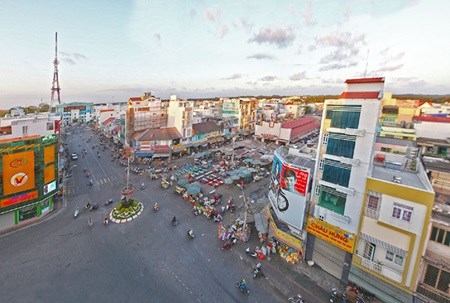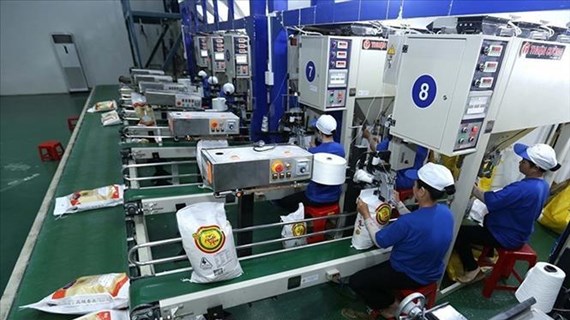VN has made big gains, but long way to go
Despite 30 years of renewal, positive changes in its economy, and at one time bearing the tag of "Asia's Next Dragon", Vietnam’s position in global rankings has not improved to any great extent.
 A view of Tra Vinh city in the southern province of Tra Vinh (Photo: VNA)
A view of Tra Vinh city in the southern province of Tra Vinh (Photo: VNA)Hanoi (VNA) - Despite 30 years of renewal, positive changes in its economy, and at one time bearing the tag of "Asia's Next Dragon", Vietnam’s position in global rankings has not improved to any great extent, according to a report presented by Associate Professor Tran Dinh Thien, Director of the Vietnam Institute of Economics.
Thien made his report to the Vietnam Economic Forum reviewing economic development over 30 years in Vietnam, held in the capital city of Hanoi recently.
He pointed out that after 30 years of renewal, Vietnam had made positive changes in economic growth, including high growth for several consecutive years, lifting millions of people out of poverty, introducing many improvements in economic restructuring, and opening up to global integration.
From a poor agricultural country with a low average per capita GDP of only 98 USD, Vietnam went on to join the group of middle income countries. GDP per capita in 2013 stood at 1,910 USD, a seven-fold increase compared with 2000 and 9.5-fold compared with 1986, when the "doi moi" economic reforms were introduced. And it has reached about 2,200 USD per capita today.
"Vietnam is now a signatory to many trade agreements of large scale and has attracted increasing amounts of foreign direct investment (FDI). The FDI sector has grown strongly and now accounts for nearly 70 percent of Vietnam’s exports."
"But Vietnam is still yet to escape from its low level of development and this level is expressed in outdated technology, market economic institutions being hampered by backward thinking, and especially the country's dependence on the Chinese economy," he said.
According to Thien, the country's economy continues to face challenges such as growth quality falling sharply, economic restructuring taking place slowly, and the development of the private sector remaining unsustainable. Low labour productivity persists and productivity growth is declining. These are barriers that have hampered Vietnam’s economic development.
Last year, Vietnam was still in the early stages of economic development, while Thailand and China were in the third stage of development and Malaysia had moved to the fourth stage.
It's no surprise therefore that Vietnam’s global ranking has seen little improvement. The improvements that have been seen are those commonly found within the group of economies in the early stages of development. Since 2010, the country’s ranking has slipped from 59th to 68th.
Economist Vu Anh Tuan said the economic growth of the last 30 years had not yet been fast enough to narrow the gap between Vietnam and other regional countries. He noted, the economic development in recent years had not been sustainable, the competitiveness of the economy was still low and the macroeconomic balance remained unsustainable. The resources had not been mobilised and used with high efficiency. As a result, the economic growth was still mainly based on the exploitation of natural resources, cheap labour cost and foreign investment attraction.
Tuan said Vietnam’s industrial development for many years still depended largely on foreign capital and technology. Vietnamese enterprises currently invested in innovative technologies at low levels. Their expense on technology renovation was estimated at about 0.2 percent to 0.3 percent of their revenues. Meanwhile, Indian enterprises spent about 5 percent for technology renovation and the Republic of Korea 10 percent. "The problem here is that most Vietnamese businesses in the manufacturing sector are satisfied with the technology being used by them," he said.
Le Xuan Ba, former director of the Central Institute for Economic Management said that Vietnam's economy was not only lagging behind other countries but also behind its own development targets.
Ba said agriculture is coping with backwardness in all aspects. It is more dangerous as Vietnamese people have to eat unsafe farm products. If the country could not address this problem, Vietnamese agriculture would not take advantage of opportunities offered by global integration.
According to Thien, Vietnam’s 30 years of economic reforms have seen ups and downs along with breakthroughs in opening up markets and integration. Significant achievements have been recorded, including high economic growth for several consecutive years, lifting millions of people out of poverty.
Despite the admirable achievements over the last three decades, Vietnam is still behind developed countries and the gap has become wider. The country also lags behind in global rankings regarding most development criteria. Only it can improve its position."
According to Professor Nguyen Quang Thai, a member of Vietnam Economic Association, in the last 30 years Vietnam’s socioeconomic situation has developed rapidly in many fields and been recognised around the world, in particular the country's rapid economic growth. Innovation has helped to bring a new vitality to development. However, if the country does not make drastic changes, it will be left behind and lag even further behind in five to ten year's time.-VNA












